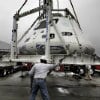Last Updated on May 30, 2018
Space Day is May 6! Space Day was created to promote math, science, and technology and highlight the work of space explorers. Celebrate by nurturing your students’ enthusiasm for the wonders of space and exploration by listening to these stories about space.
Space Programs
NASA is launching a new spacecraft designed to carry astronauts into deep space. Listen to this story to learn more about Orion’s design and goals.
Voyager 1, launched 35 years ago, became the first man-made object to leave our solar system and enter interstellar space. Listen to what researchers have been learning from the edge of our solar system.
 Hubble Telescope Celebrates 24 Years in Space
Hubble Telescope Celebrates 24 Years in Space
The Hubble Telescope has been transmitting data from space for 24 years. Listen to hear about the information we still get from the Hubble Telescope.
President John F. Kennedy supported our U.S. space program in response to the perceived threat from the Soviet Union. Use this story to discuss the differences between the Soviet and the U.S. space programs at that time.
Astronauts
This story is about astronaut Ronald McNair, as told by his brother Carl. He tells about the racially-segregated rural south and how this shaped their lives. Listen to the tragic end of Ronald McNair’s life and the story of his journey.
After living on the International Space Station for almost a year, NASA astronaut Scott Kelly returned safely to Earth. Listen to the story to hear more about this astronaut’s admirable and historic journey.
In 2024 crews of four will be sent to Mars with the goal of creating a permanent human settlement there. Use this story to discuss space travel and listen to learn about a college student who will be on this trip.
The Science of Space
Gravity keeps the earth, moon and sun in orbit, and us on the ground. And yet, it is the weakest of all the forces. Listen with students to learn about gravity and velocity, trajectories, and strength.
Scientists recently announced a huge discovery—gravitational waves. These ripples were predicted by Albert Einstein a century ago as a part of his theory of relativity. In this story you will hear what gravitational waves sound like and learn more about their discovery.
The sun is a star that sits at the center of our Solar System. It provides heat and a gravitational pull for all of the planets that orbit it. Listen to hear more about how the sun works.
Scientists usually study stars from afar, through a telescope. One scientist discovered a way to study stars up close, and on Earth — through a machine that acts like a powerful energy generator.
Is there a possibility for humans to live on another Earth-like planet? Scientists claim that there are potential candidates in space. Listen with your students to learn about new possibilities.











